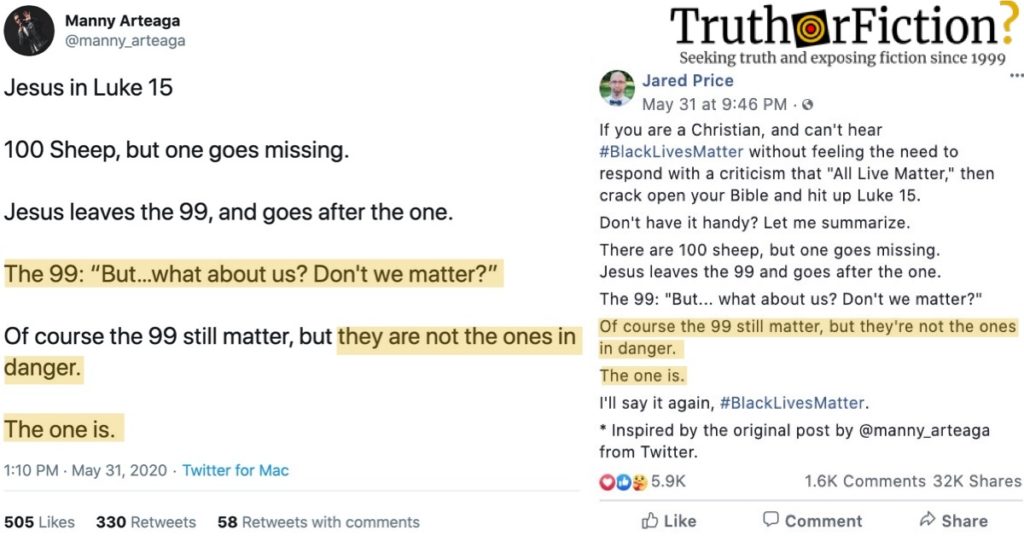On May 31 2020, a Facebook analogy about Jesus and a flock of 100 sheep (where one was lost and 99 were safe) began circulating:
That poster, Jared Price, credited Twitter user Manny Arteaga for the analogy. Arteaga shared a similar post earlier on May 31 2020:
Price’s version on Facebook attracted far more shares than the version on Twitter. It read:
If you are a Christian, and can’t hear #BlackLivesMatter without feeling the need to respond with a criticism that “All Live Matter,” then crack open your Bible and hit up Luke 15.
Don’t have it handy? Let me summarize.
There are 100 sheep, but one goes missing.
Jesus leaves the 99 and goes after the one.The 99: “But… what about us? Don’t we matter?”
Of course the 99 still matter, but they’re not the ones in danger.
The one is.
I’ll say it again, #BlackLivesMatter.
* Inspired by the original post by @manny_arteaga from Twitter.
Twitter’s character limitations meant that shortened versions of the story spread on that platform, which meant that occasionally the details of its origin were left out. Arteaga originally referenced “Luke 15,” and an entry on BibleGateway.com read:
Luke 15 New International Version (NIV)
The Parable of the Lost Sheep
15 Now the tax collectors and sinners were all gathering around to hear Jesus. 2 But the Pharisees and the teachers of the law muttered, “This man welcomes sinners and eats with them.”3 Then Jesus told them this parable: 4 “Suppose one of you has a hundred sheep and loses one of them. Doesn’t he leave the ninety-nine in the open country and go after the lost sheep until he finds it? 5 And when he finds it, he joyfully puts it on his shoulders 6 and goes home. Then he calls his friends and neighbors together and says, ‘Rejoice with me; I have found my lost sheep.’ 7 I tell you that in the same way there will be more rejoicing in heaven over one sinner who repents than over ninety-nine righteous persons who do not need to repent.
In the context of the Bible, the Parable of the Lost Sheep is typically viewed as one of redemption for all, perhaps a bit afield of the reference spreading on social media. Nevertheless, existing interpretations of that verse advocated for temporary focus on those in need of support (“lost sheep”), particularly when the other 99 sheep remained safe:
a. If he loses one of them: It isn’t strange that a sheep would be lost or that a shepherd would seek the sheep. It does seem strange that a shepherd would endanger 99% of his flock for the sake of 1%. Either the safety of the 99% was assumed, or the point of this parable is in the rejoicing, not in the neglect of 99% for the sake of 1%.
[…]
b. Go after the one which is lost until he finds it: The lost sheep would never save himself, or find the shepherd himself. If the shepherd did not take action, the sheep was doomed.
A Biblical excerpt known as the Parable of the Lost Sheep circulated in the wake of widespread protests and as a theological support for the Black Lives Matter movement in late May and early June 2020. The text was correctly identified as part of the Gospel of Luke, and it was accurately relayed in several circulating posts.
- There are 100 sheep, but one goes missing. Jesus leaves the 99 and goes after the one.
- Jesus in Luke 15 100 Sheep, but one goes missing. Jesus leaves the 99, and goes after the one. The 99: “But…what about us? Don't we matter?” Of course the 99 still matter, but they are not the ones in danger. The one is.
- Luke 15: The Parable of the Lost Sheep
- LUKE 15 – THE JOY OF FINDING THE LOST

